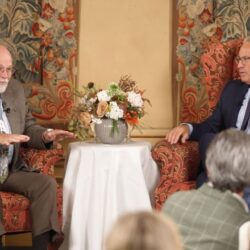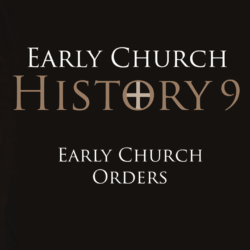This is part three of a series of posts called Habits of a Disciple.
There’s something humbling about asking for help. Think of a stubborn man who refuses to ask for directions, though he’s completely lost. Why does he persist? Why doesn’t he pull into some gas station and get help? I suppose it is because he does not want to admit that he needs it. Somehow he just knows that after one more turn he’ll get his bearings—a familiar sight will trigger his memory and instantly he’ll be back on track. But, in reality what happens, especially when the GPS isn’t working? He wastes more and more time, which results in more and more frustration. Finally, in exasperation he pulls over and asks someone and within a couple of minutes all of his angst and anguish melts away and he’s back on track. Although we can all agree that this bewildering stubbornness—typically found among the male species—is ridiculous, we sometimes act just the same way when it comes to prayer.
Prayer, at its core, is simply talking to God. The prayers in the bible begin with such words as, “Oh Yahweh,” “My God, my God,” “Our Father in heaven,” or just “God,” (Exodus 32.11; Psalm 22.1; Matthew 6.9; Luke 18.13). We don’t find any one specific way all prayers begin or even just one kind of prayer. In fact, the scriptures contain many different types of prayer, including praise, thanks, petition, intercession, confession, and scripture prayer. In what follows I’d like to briefly describe these six types of prayer before moving on to talk about some prayer strategies as well as consider what to do when your prayers go unanswered.
Although praise is one of the most dominant prayer modes in the bible, people tend to ignore it today. Before going on to describe praise more, take a look at this example from king David:
1 Chronicles 29.10-12
10 Blessed are you, O LORD, the God of Israel our father, forever and ever. 11 Yours, O LORD, is the greatness and the power and the glory and the victory and the majesty, for all that is in the heavens and in the earth is yours. Yours is the kingdom, O LORD, and you are exalted as head above all. 12 Both riches and honor come from you, and you rule over all. In your hand are power and might, and in your hand it is to make great and to give strength to all.
Notice how David simply talks to God about God. He tells God who he is. God is great, powerful, glorious, victories, majestic, the owner of everything, the head above all, etc. In this portion of his prayer, David doesn’t ask God for anything. He doesn’t thank God for what he’s done for him. He just tells God who he is. Here is another example:
Nehemiah 9.6-8
6 “You are the LORD, you alone. You have made heaven, the heaven of heavens, with all their host, the earth and all that is on it, the seas and all that is in them; and you preserve all of them; and the host of heaven worships you. 7 You are the LORD, the God who chose Abram and brought him out of Ur of the Chaldeans and gave him the name Abraham. 8 You found his heart faithful before you, and made with him the covenant to give to his offspring the land of the Canaanite, the Hittite, the Amorite, the Perizzite, the Jebusite, and the Girgashite. And you have kept your promise, for you are righteous.
Here, rather than talking about God’s character the prayer focuses on what God has done in the past. He created the heavens and earth, he chose Abram, and he kept his promise. This is another form of praise. This is such a great way to begin your prayer. Start with praise and you will not only bless God but remind yourself whom you are talking to. Open with statements about his character: his holiness, glory, strength, genius, love, compassion, faithfulness, justice, etc. Talk about what he has done in the past: how he created the world, how he called Abraham and his descendants, how he protected his people over the millennia, how he sent his son, how he poured out his spirit, etc. As you develop this part of your prayer life, you will discover that you run out of praise ammunition pretty quickly. Fear not, the scriptures are loaded with what you need, particularly the Psalms.
Thanksgiving is a second important mode to include in your regular prayers. Simply put, thanksgiving is thanking God for what he has done for you. Whereas praise focuses more on what God has done in general or in history, thanksgiving is more personal. Practicing gratitude in this way will produce huge benefits in many areas of your life, including emotional, social, physical, professional, and personality-related. Genuine gratitude recognizes the blessings you have. Thank God for your shelter, your clothes, your food, your very life. Thank him for saving you from sin, for making you his child, for giving you a wonderful kingdom to look forward to. Thanking God is like pulling a loose thread on a garment—it is easy to keep going and unravel more and more of what he has done for you.
Next, I want to talk about petition or supplication, which is when we ask God to help us with something. This is probably the most common form of prayer most of us practice. “God I ask that you help me get a job, a spouse, a raise, etc.” Some people are uncomfortable petitioning God, because they feel it is too self-focused or too trite. Others exclude other kinds of prayer and focus solely on petition, as if God only exists to give you your heart’s desires. Neither of these perspectives is particularly helpful. Be direct and ask for what you need. God is a loving father who wants to bless you. Be specific, sincere, and simple. You never need to worry about trying to impress God with how cleverly you word your prayers; just tell him what is you want and leave the rest with him.
Intercession is closely related to petition. Essentially, intercession is petition, but for others, instead of yourself. In intercessory prayer, we lift up the concerns and needs of our family, friends, and others. Once again, we have plenty of examples of this in the bible: Abraham prays for Sodom, Moses intercedes for Israel after they worshipped the golden calf, Jesus prayed for Peter that his faith wouldn’t fail, and most of Paul’s prayers are for the various churches to whom he wrote letters. Although God will not force our loved ones to make good decisions, praying for them faithfully can open up incredible possibilities for change that would not be there otherwise.
If petition and intercession are the most popular types of prayer, confession is probably the least. However, confession is an extremely important kind of prayer, because it clears any past dysfunction out of the way so that you can have a restored relationship with God. Imagine your friend stole your phone and sold it and you found out. The next time that “friend” asked you for a favor, you would find it nearly impossible to comply. The relationship is broken. Your friend has sinned against you. However, if she comes clean and tells you she is sorry and wants to do whatever it takes to make it right, you can take steps towards repairing that relationship. When we sin, even if it is against another person, it still harms our fellowship with God. This is why John writes, “If we confess our sins, he is faithful and just to forgive us our sins and to cleanse us from all unrighteousness” (1 John 1.9). God doesn’t want our relationship with him tainted or marred by sin. He has graciously provided us a way forward. We must come to our senses, confess our sin to him, and ask him to forgive us. Once we do this and turn away from our sin we can have confidence that he will hear our prayer.
The last kind of prayer I want to consider with you is scripture prayer. The bible contains many good example prayers ready for us to use in our own lives. The most famous scripture prayer is the one Jesus taught his disciples when they asked him for instruction on how to pray.
Matthew 6.9-13
Our Father in heaven, hallowed be your name.
Your kingdom come, your will be done, on earth as it is in heaven.
Give us this day our daily bread,
And forgive us our debts, as we also have forgiven our debtors.
And lead us not into temptation, but deliver us from evil.
For yours is the kingdom and the power and the glory, forever. Amen
Although some people repeat this prayer without truly thinking about what they are saying, that’s no reason to reject it for your own use. There’s no need to say it a million times in a row, but there’s also no reason to ignore it either. Try incorporating the Lord’s Prayer in your daily routine, perhaps when you rise from bed. Pray it with sincerity and see what happens. What’s so great about scripture prayers like this is that we don’t have to worry about praying according to God’s will. If he included a prayer in scripture, chances are that it’s a good example for us. Here are some other scripture prayers you might want to consider: Acts 4.24-31; Eph 1.17-23; 3.14-21; Phil 1.9-11; Col 1.9-12; 1 Thes 3.11-13; 1Tim 1.12-17. In addition, many of the Psalms are actually prayers to God that you can use to expand your prayer repertoire.
Now that we’ve surveyed six prayer components—praise, thanksgiving, petition, intercession, confession, and scripture prayers—I want to share some practices that I’ve found useful at times. The first is to try different postures. Some people only ever pray seated with their hands pressed against each other. However, there is no single prayer posture that the bible recommends. When Jesus prays, he tends to look upwards (John 17.1). Likewise Paul urges Timothy that “men should pray, lifting holy hands” (1 Timothy 2.8). Other times, Paul mentions bowing his knees (Ephesians 3.14). Moses once lay prostrate before God for forty days (Deuteronomy 9.18). In Jesus’ moment of crisis in Gethsemane he “fell on his face and prayed” three times (Matthew 26.39). Try different physical postures and find one that works for you and your situation. Also, you may find it helpful to have a set time each day when you can pray in depth. For many of us, this works out best in the morning, so that we begin the day on the right foot. However, do what fits your schedule. If you find yourself drifting during prayer, try journaling your prayers or praying with someone else who can hold you accountable. Also, you may want to keep track of answered prayers and review them from time to time to build your faith.
Beyond all of these prayer strategies, God has given us one huge prayer boosting technique that can help you overcome serious issues in life—fasting. I think of fasting like installing a big antenna on my prayers. It helps me get serious about what I’m praying for. Fasting increases my fervor as well as how frequently I pray. If you are not familiar with fasting, it is when you stop eating food for a designated period of time. You will still need to drink water and should ask your doctor for guidance if you are on any medications. However, most of us can fast, at least for a day or two, when we need to really press into God on a particular issue. While fasting, every time you feel hunger pangs, you are reminded of why you are fasting and should pray. Furthermore, you’ll save a lot of extra time usually devoted to cooking, eating, and cleaning up. You can use this time to pray even more. Jesus never explicitly commanded his followers to fast, but he said, “When you fast, do not look gloomy like the hypocrites…” (Matthew 6.16). He did not say, “if you fast,” because he assumes that this is something people do. To read more about fasting consider these verses: 1 Kings 21.27-29; Nehemiah 1.3-2.6; Joel 2.11-14; Matthew 6.16-18.
Beyond fasting, a second way to significantly boost our prayer effectiveness is by reaching out to others to pray along with you. One of the most powerful texts on this is a promise God made to Solomon right after he finished building the temple:
2 Chronicles 7.14
If my people who are called by my name humble themselves, and pray and seek my face and turn from their wicked ways, then I will hear from heaven and will forgive their sin and heal their land.
Notice that God does not say, “If someone prays” or “If a person prays,” but “If my people.” Although our individualistic culture may balk at it, there’s a real power in group prayer, whether when the saints are all together or when people individually lift up the same concern. If you would like to enlist others to pray along with you, visit our prayer center at lhim.org/pray and submit your prayer request. Each request we receive gets posted online and emailed to people committed to prayer.
Lastly, I want to address the issue of how to deal with it when your prayers go unanswered. As you might expect, there are many reasons why God might not give someone what they asked for. If you pray for something that is contrary to God’s will, he will not give it to you. Sometimes there are timing issues. Sometimes the answer is just no. In fact, we have examples of this in scripture. God refused to answer Jeremiah’s repeated prayers for mercy on Jerusalem and even told him to stop praying for this. Paul pleaded with God to remove a thorn in the flesh, but God told him “My grace is sufficient for you, for my power is made perfect in weakness” (2 Corinthians 7.7). If such men as the prophet Jeremiah and the apostle Paul did not always receive what they prayed for, then it stands to reason that we too would sometimes not get what we want as well. But, just because God may not give us what we want when we want, that does not mean we should give up on prayer.
For whatever reason, God set things up so that prayer matters. James writes, “You do not have, because you do not ask” (James 4.2). God requires prayer and faith, but that does not reduce the matter to a mere mechanistic process like taking money out of an ATM. Think of the analogy of a child saying “please.” The parent wants the child to say “please” when she asks for something, but that does not in any way guarantee that she will get what she asks for. For example, if one of my sons asks for candy for breakfast, he can say “please” all he wants and I’m still going to say “no,” because candy is a terrible breakfast for him. However, if he said to me, “give me the cereal,” I may still refuse to comply, not because it is bad for him, but because he didn’t say “please.” So, saying “please” might be necessary but it is certainly not sufficient for me to give my boy what he wants. So is faith with God. Faith is the great activator. Without it, even Jesus could not do many miracles (Matthew 13.58), but with it sometimes the answer is still “no” or “not yet.” But even in those times when we don’t get the result we asked for, we cannot give up. After all, what’s more important: God or what God can give you?
Read part four: Serving








I needed this and am Taught on how to pray.
Glory to God